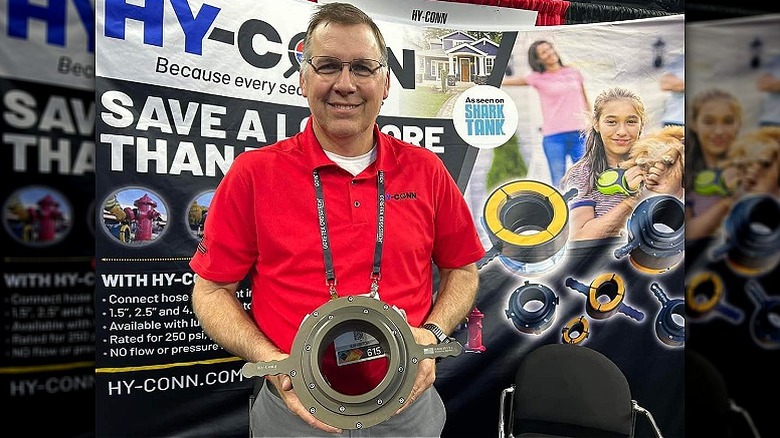Shark Tank's Hy-Conn: What Happened To The Brand After Its Season 2 Pitch
Jeff Stroope, a full-time captain and maintenance supervisor in his Arkansas fire brigade, found it was taking too long to get water to the scene one day. This was the spark for an idea Stroope worked on during his off hours. He believed it would revolutionize the way fires would be fought in the future, make millions, and save lives. Hy-Conn, a quicker fire hydrant connector for hoses that could connect to a hydrant within three seconds, was born. Stroope had already done the groundwork of surveying firehouses across the country to gauge their interest, and even found a potential distributor for the product. The only thing he needed was money.
When Stroope walked into the "Shark Tank" studio in Season 2, flanked by a pair of firemen in uniform, he couldn't have predicted his ask of $500,000 for a 40% equity stake in Hy-Conn would've caught the attention of the wealthiest Shark on the program, Mark Cuban. To be fair, none of the Sharks were particularly impressed with the eight-second difference they counted between the standard fire hose connection and the Hy-Conn connector. That's until Stroope presented them with a Hy-Conn garden hose connector all the Sharks believed was the real play. A bidding war between Cuban and Kevin O'Leary ensued. In the end, Stroope accepted Cuban's offer of $1.25 million for full ownership of Hy-Conn with a three-year $100,000 salary agreement, and 7.5% royalty in perpetuity. So what happened to Hy-Conn after that?
Someone changed the terms of the deal
What should've been a happy story for everybody quickly turned sour. In a March 2012 post by Jeff Stroope on Hy-Conn's Facebook page, Stroope suggested that the terms of his "Shark Tank" arrangement with Mark Cuban began to change within weeks of Cuban making the deal. From Stroope's memory of the interaction, Cuban claimed he was disinterested in manufacturing products and didn't actually want to give Stroope money to do that. While Stroope insisted he had no ill will toward Cuban for pulling out, he did say he wished he had accepted O'Leary or Robert Herjavec's offers.
O'Leary offered something closer to Stroope's original ask of $500,000 — but strictly for the garden hose connector, with a 3% cut in perpetuity — while Herjavec would've offered a similar deal to Cuban but for less money. As a result, according to the post, while Stroope had ideas for connectors for the oil and gas industry, homes, and professionals, the money wasn't there to get anything into production.
From Cuban's perspective on the matter, however, it made more sense to license the product to other companies to manufacture, which would obviously mean less expense and more profit for Cuban. According to GOBankingRates, Cuban has also suggested that Stroope had exaggerated Hy-Conn's sales numbers to inflate the value of the company. While there's at least one "Shark Tank" deal Mark Cuban regrets passing on, Hy-Conn doesn't appear to be one of them.
The company floundered but is still going
While that could've been the end for Hy-Conn, a venture studio called 101 Ventures partnered with Jeff Stroope to keep Hy-Conn alive. How that went is questionable. The 101 Ventures site is inactive and can't be reached, and although Hy-Conn's online shop boasts "Great things are on the horizon," there aren't any items displayed. That said, there's maybe better signs of life on Hy-Conn's still active Facebook page, where Stroope can still be seen making the rounds at trade shows demonstrating the effectiveness of his fire hydrant connectors. He's also been seen at the Fire Department Instructor's Conference, and does offer products for wholesale on the Hy-Conn site, which is available for vendors willing to go through a verification process.
A Facebook reel dated November 27 shows a manufacturing facility in his hometown of Cabot, Arkansas, showing stacks of fire hydrant connectors and some that appear to be in the process of being manufactured. So while Hy-Conn's success may have stalled, the jury is still out on whether or not this can become one of most profitable "Shark Tank" products of all time – but like Mark Cuban, we wouldn't bet money on it just yet.


